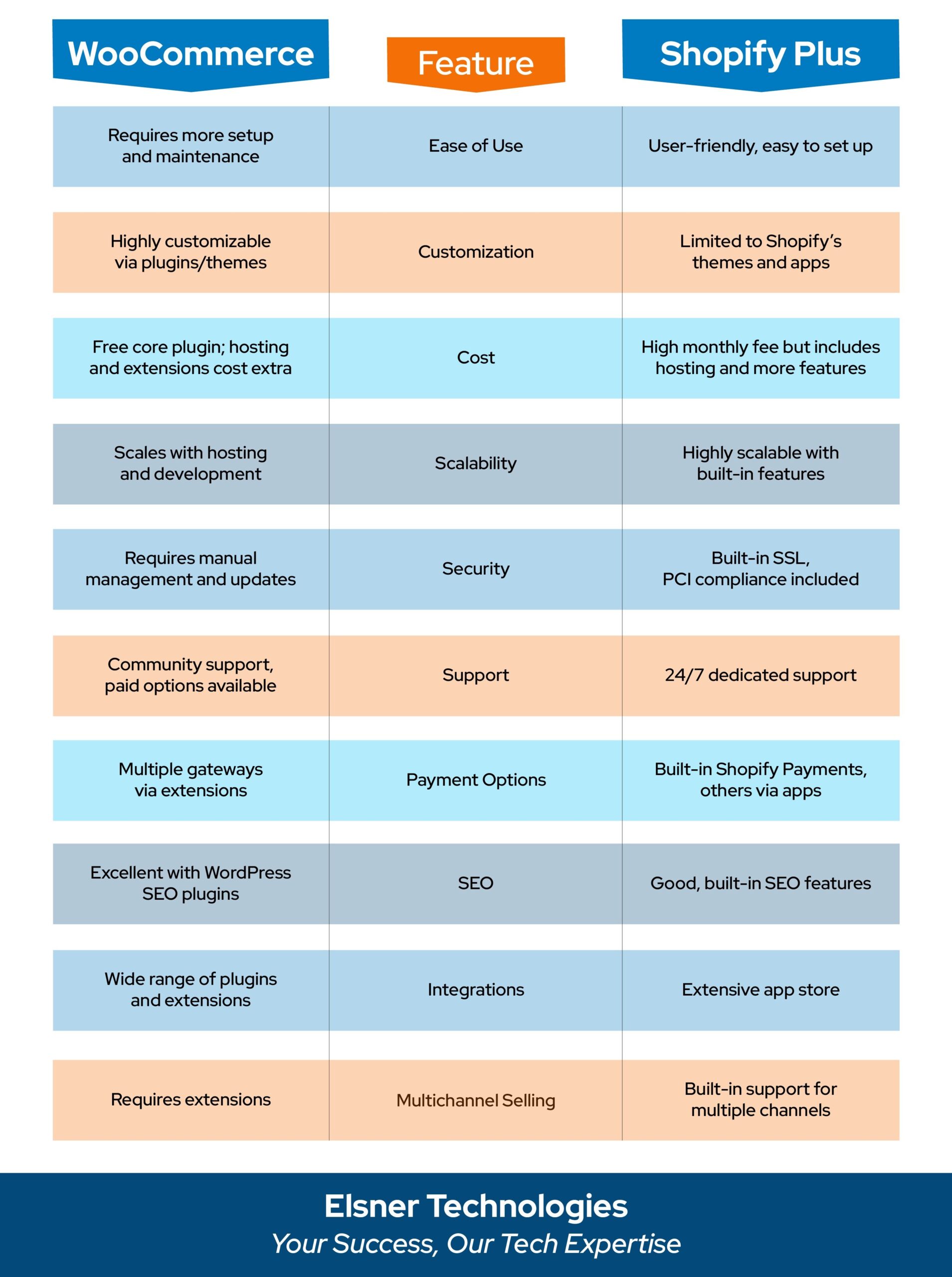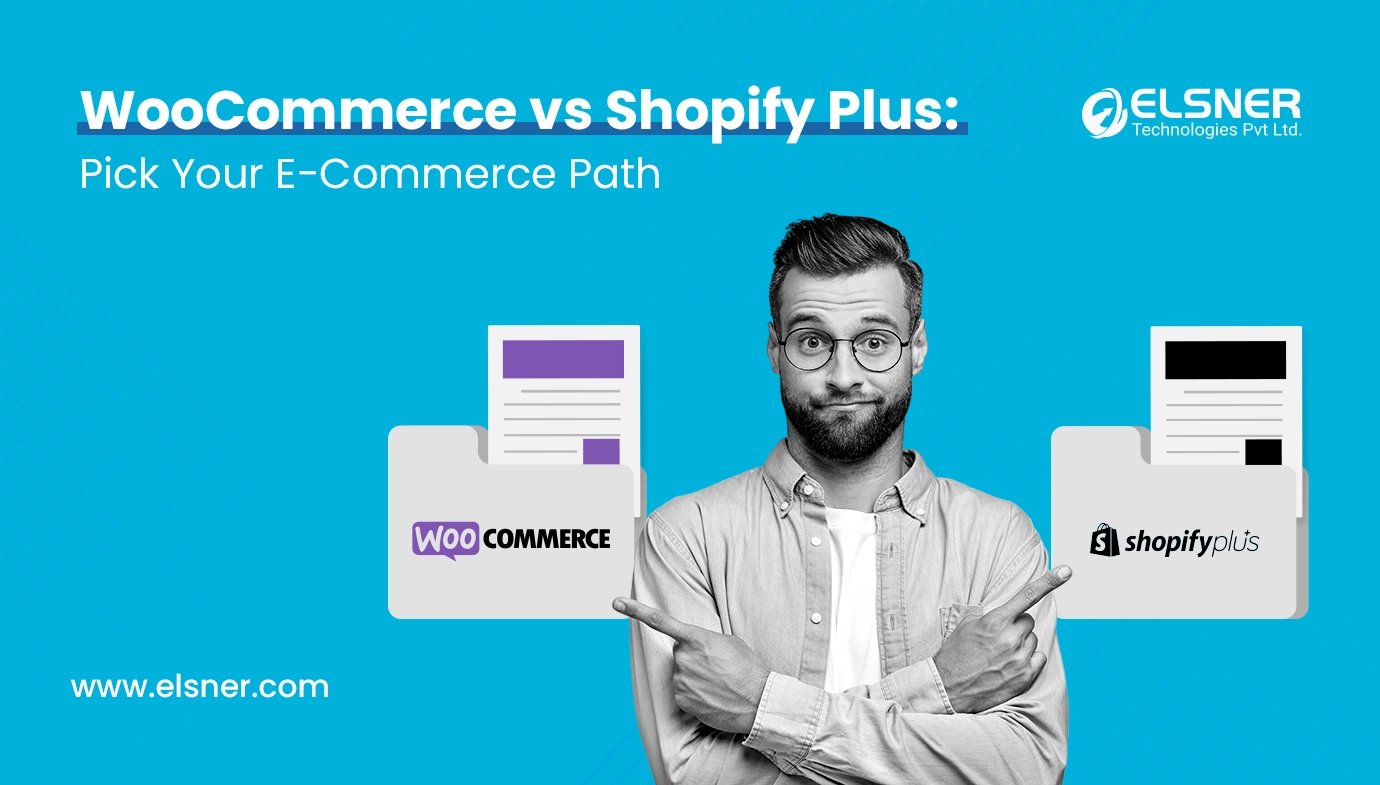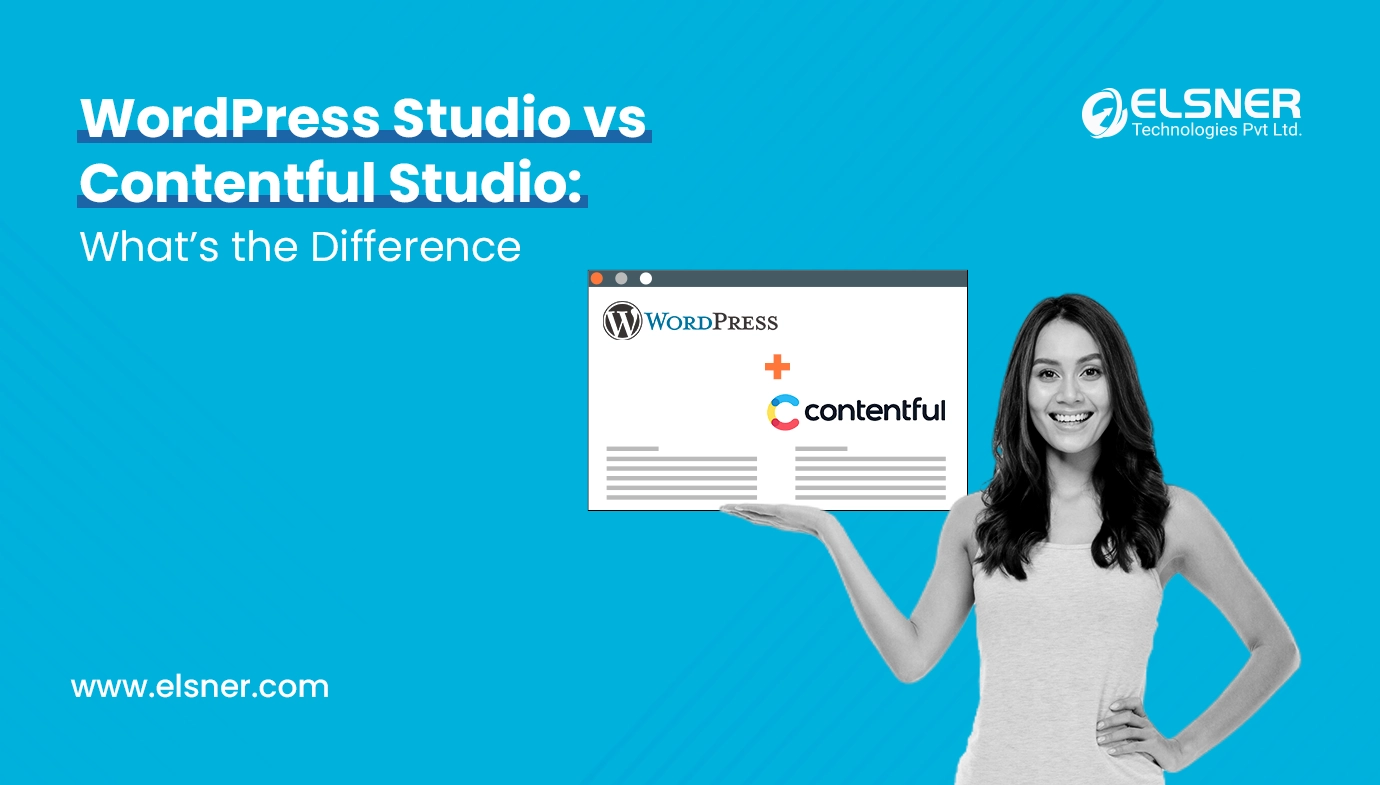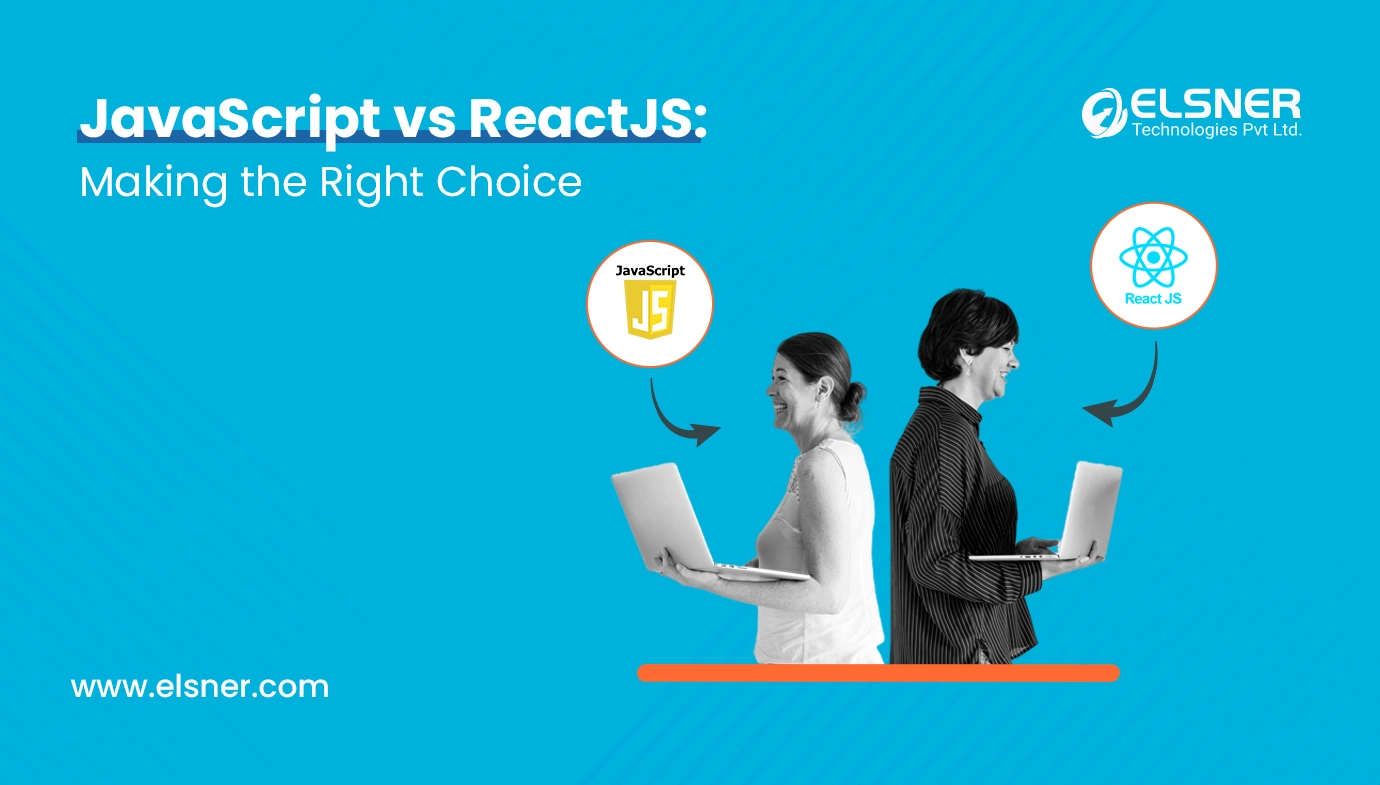- What is WooCommerce?
- What is Referred to as Shopify Plus?
- Comparison of Key Features
- What are the Similarities Existing between Shopify Plus and WooCommerce?
- What are the Key Distinctions between Shopify Plus and WooCommerce?
- Ease of Use
- Themes
- Plugins and Integrations
- SEO
- Customer Support
- Pricing
- What are the Pros and Cons of WooCommerce?
- Pros:
- Cons:
- What are the Pros and Cons of Shopify Plus?
- Pros:
- Cons:
- WooCommerce vs. Shopify Plus: What to Choose When?
- In a Nutshell
Are you an Ecommerce business owner who is planning to select the appropriate platform? If so, two most common platforms that you are most likely to come across are WooCommerce and Shopify Plus. In case you are confused between these two platforms, then understanding the differences between them is crucial before you choose WooCommerce experts for your unique project requirements.
We will focus on discussing the key similarities and distinctions in this guide. But, before that, you should gain a clear understanding about Shopify Plus and WooCommerce. So, let’s dig in:
What is WooCommerce?

WooCommerce is a robust and extensively employed open-source Ecommerce plugin that is designed for WordPress. It is a recognized CMS or content management system which lets you transform a standard WordPress site into a fully functional Ecommerce store. To get the most out of this platform, all that you need is to opt for the Best WooCommerce Services.
What is Referred to as Shopify Plus?
Shopify Plus is known to be an enterprise-level Ecommerce platform that is typically designed in a manner in order to cater to the requirements of large businesses and high-volume merchants.
It is built on the core features of Shopify and thereby providing dedicated support, intricate functionalities and improved scalability. Knowing about the key features of both these platforms is important before you choose professional WooCommerce or Shopify development services.
Comparison of Key Features

What are the Similarities Existing between Shopify Plus and WooCommerce?
Though having a few differences, there are some essential features and functionalities that WooCommerce and Shopify Plus have in common. Let’s find out those in detail:
- Both platforms have fully functional marketplaces and boast an extensive range of themes and templates through which users can easily customize the look of their stores to blend with their brand identities.
- They both provide quite a diversity of apps and extensions that can be applied to expand the main functionality of an online store with specific features like payment gateways, inventory management systems, and marketing tools.
- WooCommerce and Shopify Plus are specifically designed and customized in a manner so that it meets not only an online store’s needs but also those who work with them.
- Moreover, they both easily integrate with many third-party tools and services widely used today, including marketing platforms, analytics tools, and fulfillment services.
These are why both WooCommerce and Shopify Plus are flexible and versatile choices for every other type of business across the market. You can get in touch with an agency possessing a dedicated team of Woocommerce specialists, if you want to know more.
What are the Key Distinctions between Shopify Plus and WooCommerce?

WooCommerce and Shopify Plus have a lot of differences especially in terms of advantages and features. We will discuss some of the important distinctions in the following section. So, let’s discover:
Ease of Use
WooCommerce runs as a plugin on WordPress, and it does call for some familiarity about WordPress for navigation and effective handling of an online store. You can even opt for professional WooCommerce development services to get the best outcomes. In contrast, Shopify Plus is much more user-friendly, offering an intuitive interface and simple setup.
Themes
WooCommerce does offer a vast array of themes. However, their quality and consistency are subjective, as they are developed by various third-party providers. Shopify Plus, on the other hand, you provide a range of professionally designed responsive themes that are visually appealing.
Plugins and Integrations
The platform of WooCommerce possesses a vast plugin library, which offers users the much-needed flexibility to tailor their Ecommerce store with certain functionalities. Shopify Plus, however, provides a curated selection of apps along with integrations that have been vetted thoroughly. So, it ensures a greater level of reliability and compatibility.
SEO
WooCommerce leverages the robust SEO abilities of WordPress. It typically entails solid optimization alternatives, tailored permalinks, and intricate SEO plugins. On the contrary, Shopify Plus, also provides a solid set of SEO features. However, it may fail to offer the same level of customization like WooCommerce. You can reach out to an expert Woocommerce developer if you are looking for related aid.
Customer Support
As WooCommerce is an open-source platform, it hugely depends on documentation, community forums, and third-party support for assistance. In terms of customer support, Shopify Plus is involved in offering 24/7 dedicated support, especially through different channels. If you want the best customer support, then it is a good idea to go for cutting-edge Shopify development solutions.
Pricing
Pricing is another differentiator. WooCommerce is free to use and so, it is considered to be a more cost-effective option. However, in this case, users should essentially take into consideration specific expenses that are related to themes, hosting and plugins. Shopify Plus, is known to be a fully hosted solution and thereby it is known for providing a more comprehensive package. However, its pricing is somewhat higher.
To determine which specific platform between Shopify Plus and WooCommerce better aligns with your unique requirements and goals, it is essential to evaluate your technical expertise, specific requirements, budget, etc. To learn further, you can consider opting for the Best Shopify custom development solutions.
What are the Pros and Cons of WooCommerce?
WooCommerce comes with many interesting benefits and limitations that you should essentially have a clear idea about before making a choice. So, let’s find out:
Pros:
- Customizability and flexibility: Users can tailor their online stores to meet specific design and functionality requirements.
- Strong focus on security: Regular updates and dedicated efforts to address vulnerabilities ensure the safety of both customer data and the online store itself.
Cons:
- Limited to WordPress: WooCommerce can only be used on websites hosted by WordPress.
- Potential costs: While WooCommerce itself is free, many extensions and premium features come at a cost.
- Performance impact: Installing too many plugins can affect the website’s performance and memory usage.
- Maintenance and security: As a self-hosted platform, the burden of maintenance and security updates falls on the site owner.
What are the Pros and Cons of Shopify Plus?
Shopify Plus, also has certain pros and cons that businesses should essentially consider. Let’s have a quick look at those:
Pros:
- Customizability: Particularly in the checkout process, allowing users to tailor the experience to match their brand identity and optimize for increased conversions.
- Merchant Success Program: Offers resources, guidance, and tools to help merchants achieve success in their online businesses.
- Excellent customer support: 24/7 dedicated support via various channels ensures prompt assistance for any issues or questions.
- Integrated Shopify Payments: Supports a wide range of payment gateways and includes conversion rate optimization features like Shop Pay.
Cons:
- Higher cost: Shopify Plus comes with a higher price tag compared to WooCommerce.
- Additional transaction fees: If using a third-party payment gateway, additional transaction fees may apply.
WooCommerce vs. Shopify Plus: What to Choose When?

In a Nutshell
Thus, the choice between Shopify Plus and WooCommerce is a big decision for any Ecommerce business owners. Both of these platforms provide distinct advantages and effectively caters to various requirements. After reading this definitive blog post, we hope that you have got a better idea about which one will best suit your business needs.
If you are still confused and looking for any related aid, all that you need is to hire a WooCommerce developer. They are dedicated towards offering best-in-class WooCommerce development services that effectively matches with your goals.

About Author
Pankaj Sakariya - Delivery Manager
Pankaj is a results-driven professional with a track record of successfully managing high-impact projects. His ability to balance client expectations with operational excellence makes him an invaluable asset. Pankaj is committed to ensuring smooth delivery and exceeding client expectations, with a strong focus on quality and team collaboration.




